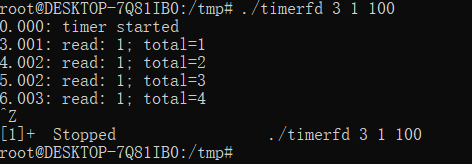1. 简介
timerfd的由来比较简单,我们以往在使用定时器时,需要设定超时时间和超时后的回调函数,在定时器时间到来时,我们所注册的回调函数将会被执行。但是这种定时器很难被epoll等I/O多路复用机制接管。于是Linux下的timefd应运而生,使用timerfd创建出的定时器是基于文件描述符进行管理的,在达到超时时间时,描述符将置为可读,并可以从中读取到超时次数(启动定时器后或上次read之后的超时次数)。
Linux提供如下三个系统调用去使用timerfd。如果曾经使用过Linux下的定时器,这三个系统调用和timer_create, timer_settime以及timer_gettime类似。
#include <sys/timerfd.h>
int timerfd_create(int clockid, int flags);
int timerfd_settime(int fd, int flags, const struct itimerspec *new_value, struct itimerspec *old_value);
int timerfd_gettime(int fd, struct itimerspec *curr_value);下面分别进行介绍。
timerfd_create
创建一个定时器对象,其中clockid用来指定时钟的类型,比如常见的CLOCK_REALTIME和单调时钟CLOCK_MONOTONIC;flags主要对这个定时器描述符进行设置。TFD_NONBLOCK用来设置描述符在进行操作时是否阻塞;TFD_CLOEXEC用来设置当进行exec族操作时,对应的描述符进行关闭。
timerfd_settime
用来对定时器行为进行一些配置,执行这个函数后,定时器将开始工作。
其中flags对定时器的执行做一些配置,有TFD_TIMER_ABSTIME和TFD_TIMER_CANCEL_ON_SET。TFD_TIMER_ABSTIME:定时器溢出时间当做绝对时间,也就是如果更改系统时间早于这个时间,定时器将立即执行;TFD_TIMER_CANCEL_ON_SET:更改系统时间时,定时器将取消。
new_value参数主要对定时器的周期进行设置,类型为struct itimerspec。
struct itimerspec {
struct timespec it_interval; /* Interval for periodic timer */
struct timespec it_value; /* Initial expiration */
};it_interval是设置定时器的执行周期,也就是定时器每隔多久会触发一次;it_value是设置定时器初始的溢出时间,也就是第一次设置后多久会触发一次;
old_value参数如果不为空,将返回上次定时器设置的new_value参数。
timerfd_gettime
这个函数相对比较简单,返回当前定时器对象配置的时间函数。
使用样例
这里我采用man手册中的一个样例来说明如何使用timerfd。
这个样例所做的事情,就是根据程序的入参,来创建一个定时器,并设置响应的定时器第一次溢出时间,定时器间隔以及最大的溢出次数。
#include <sys/timerfd.h>
#include <time.h>
#include <unistd.h>
#include <inttypes.h> /* Definition of PRIu64 */
#include <stdlib.h>
#include <stdio.h>
#include <stdint.h> /* Definition of uint64_t */
#define handle_error(msg) \
do { perror(msg); exit(EXIT_FAILURE); } while (0)
static void
print_elapsed_time(void)
{
static struct timespec start;
struct timespec curr;
static int first_call = 1;
int secs, nsecs;
if (first_call) {
first_call = 0;
if (clock_gettime(CLOCK_MONOTONIC, &start) == -1)
handle_error("clock_gettime");
}
if (clock_gettime(CLOCK_MONOTONIC, &curr) == -1)
handle_error("clock_gettime");
secs = curr.tv_sec - start.tv_sec;
nsecs = curr.tv_nsec - start.tv_nsec;
if (nsecs < 0) {
secs--;
nsecs += 1000000000;
}
printf("%d.%03d: ", secs, (nsecs + 500000) / 1000000);
}
int
main(int argc, char *argv[])
{
struct itimerspec new_value;
int max_exp, fd;
struct timespec now;
uint64_t exp, tot_exp;
ssize_t s;
if ((argc != 2) && (argc != 4)) {
fprintf(stderr, "%s init-secs [interval-secs max-exp]\n",
argv[0]);
exit(EXIT_FAILURE);
}
if (clock_gettime(CLOCK_REALTIME, &now) == -1)
handle_error("clock_gettime");
/* Create a CLOCK_REALTIME absolute timer with initial
expiration and interval as specified in command line. */
new_value.it_value.tv_sec = now.tv_sec + atoi(argv[1]);
new_value.it_value.tv_nsec = now.tv_nsec;
if (argc == 2) {
new_value.it_interval.tv_sec = 0;
max_exp = 1;
} else {
new_value.it_interval.tv_sec = atoi(argv[2]);
max_exp = atoi(argv[3]);
}
new_value.it_interval.tv_nsec = 0;
fd = timerfd_create(CLOCK_REALTIME, 0);
if (fd == -1)
handle_error("timerfd_create");
if (timerfd_settime(fd, TFD_TIMER_ABSTIME, &new_value, NULL) == -1)
handle_error("timerfd_settime");
print_elapsed_time();
printf("timer started\n");
for (tot_exp = 0; tot_exp < max_exp;) {
s = read(fd, &exp, sizeof(uint64_t));
if (s != sizeof(uint64_t))
handle_error("read");
tot_exp += exp;
print_elapsed_time();
printf("read: %" PRIu64 "; total=%" PRIu64 "\n", exp, tot_exp);
}
exit(EXIT_SUCCESS);
}我们执行后会观察如下现象
当我们按下ctrl+Z时,程序将在后台挂起。过十几秒之后我们使用fg命令将后台的程序调度到前台继续执行,会发现继续运行时read第一次读取到的个数是11次,也说明了read从timerfd描述符中读取到的确实是定时器的溢出次数,这个定时器是个内核定时器,因为当我们程序挂起时,这个定时器其实还在工作。
